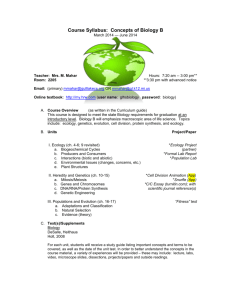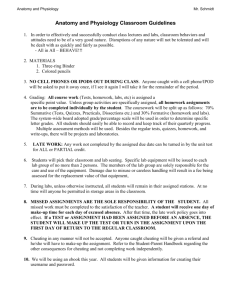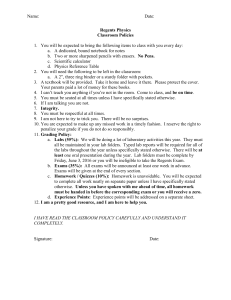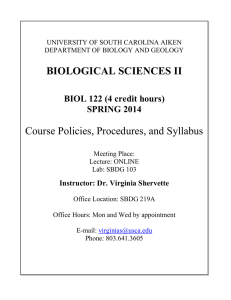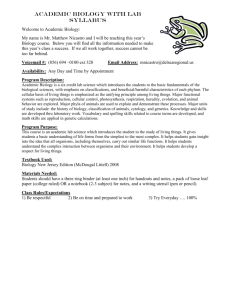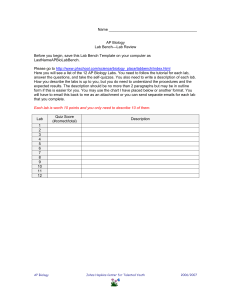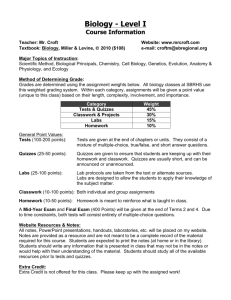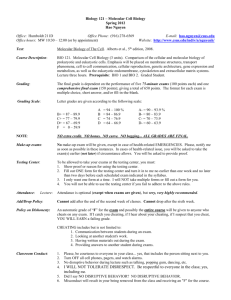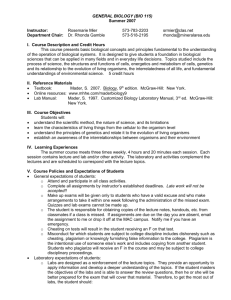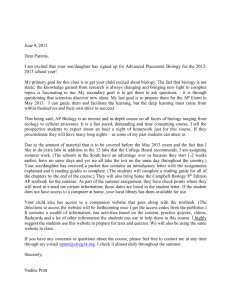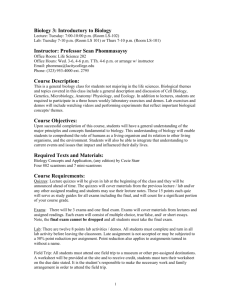Syllabus
advertisement
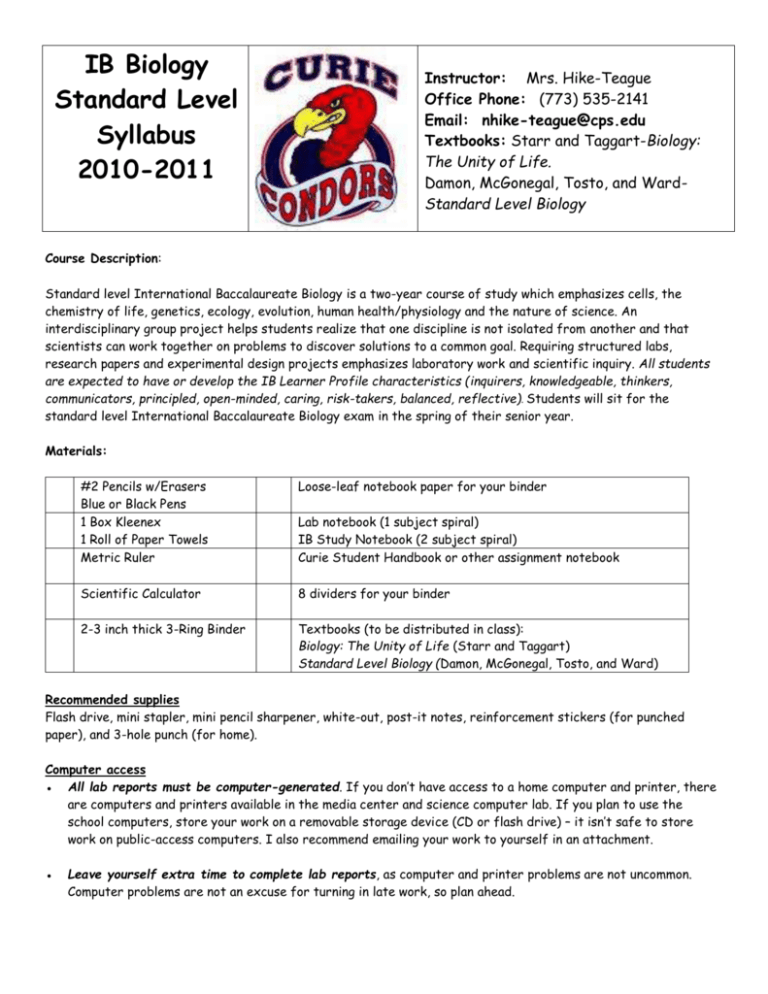
IB Biology Standard Level Syllabus 2010-2011 Instructor: Mrs. Hike-Teague Office Phone: (773) 535-2141 Email: nhike-teague@cps.edu Textbooks: Starr and Taggart-Biology: The Unity of Life. Damon, McGonegal, Tosto, and WardStandard Level Biology Course Description: Standard level International Baccalaureate Biology is a two-year course of study which emphasizes cells, the chemistry of life, genetics, ecology, evolution, human health/physiology and the nature of science. An interdisciplinary group project helps students realize that one discipline is not isolated from another and that scientists can work together on problems to discover solutions to a common goal. Requiring structured labs, research papers and experimental design projects emphasizes laboratory work and scientific inquiry. All students are expected to have or develop the IB Learner Profile characteristics (inquirers, knowledgeable, thinkers, communicators, principled, open-minded, caring, risk-takers, balanced, reflective). Students will sit for the standard level International Baccalaureate Biology exam in the spring of their senior year. Materials: #2 Pencils w/Erasers Blue or Black Pens 1 Box Kleenex 1 Roll of Paper Towels Metric Ruler Loose-leaf notebook paper for your binder Scientific Calculator 8 dividers for your binder 2-3 inch thick 3-Ring Binder Textbooks (to be distributed in class): Biology: The Unity of Life (Starr and Taggart) Standard Level Biology (Damon, McGonegal, Tosto, and Ward) Lab notebook (1 subject spiral) IB Study Notebook (2 subject spiral) Curie Student Handbook or other assignment notebook Recommended supplies Flash drive, mini stapler, mini pencil sharpener, white-out, post-it notes, reinforcement stickers (for punched paper), and 3-hole punch (for home). Computer access ● All lab reports must be computer-generated. If you don’t have access to a home computer and printer, there are computers and printers available in the media center and science computer lab. If you plan to use the school computers, store your work on a removable storage device (CD or flash drive) – it isn’t safe to store work on public-access computers. I also recommend emailing your work to yourself in an attachment. ● Leave yourself extra time to complete lab reports, as computer and printer problems are not uncommon. Computer problems are not an excuse for turning in late work, so plan ahead. Classroom Policy: Lab Safety. Each student must have returned a lab safety contract, signed by student and parent before being allowed to do lab work. Lab. Successful completion of the course requires successful completion of the labs. Points will be given according to lab complexity. All labs have to be typed using 12 Font. Please adhere to the guidelines explain in the lab report format. Although lab work is done in teams, each student will write up his/her own lab report. If you have a difficult time writing in your own words, then your understanding of the material is inadequate, so ask for help! During group work, answers and solutions may be freely shared, but all members are expected to contribute. Simply copying answers from another lab report, homework, etc. without having helped to produce the product is plagiarism and will be treated as such. NO LATE homework, labs, class assignments, projects, tests, quizzes, and exams will be accepted or given without a valid written excuse (CPS Guidelines) from parent/guardian. It is YOUR responsibility to obtain and make up all missing work. Students that have Functions are required to turn in class assignments, homework, labs, etc. they missed the next day they return to class or they will receive a zero. Only students that have a C (75%) average will be sign-out for functions. Electronics Use. Cell phones must be turned off during class. Texting is forbidden. Music devices (IPODS, mp3’s, etc) and headsets are turned off and put out of sight. During quizzes, tests, & exams electronic devices should be placed on the lab desk face down. Cheating. Cheating is never profitable. We are here to learn and cheating makes learning impossible. Cheating will not be tolerated and is clearly a serious violation of course and IB policy. The following acts of cheating are some examples of behavior that will result in disciplinary actions as set by Curie’s IB program and a zero for the work. Please refer to the IB Academic Honesty Policy on the Diploma page on the Curie website. Passing calculators during a test, quiz, or other assessment Copying someone else’s test, quiz, homework, assignment, or report Letting someone copy from a test, quiz, homework, assignment, or report Looking at notes during a test, quiz, or other assessment Sharing questions from a test with students who have yet to take the test Listing someone else’s data without giving credit, or worse, making up data to fit the expected answer. Any form of plagiarism Using opinions, facts, ideas, charts, data and direct quotes from research papers, newspapers, magazines, textbooks, websites, or another person without citing the source. Assessment: Grading will be based on a point system. Homework, labs, class assignments, projects, tests, quizzes, and exams will be graded and scored with points. At the end of the quarter, letter grades will be assigned to the total points for that quarter. Grading Scale: Grading Criteria: 90%-100% 80%-89% 70%-79% 60%-69% A B C D Class Assignments Projects Lab/IB Study Notebooks Exams 15% 5% 5% 30% Quizzes Homework Labs Tests 5% 5% 25% 10% Group 4 Project: Chicago River Macro-invertebrate Monitoring & Water Quality Analysis Students will work with IB Physics students to visit an assigned site by the Chicago River and use the following equipment to carry out their analysis: Water sampling bottle, Secchi dish, Screen sorter, Hip waders, LaMotte test kits, Keys for Macro-invertebrates, Sorting trays, Buckets, etc... Some of this equipment is supplied by The Friends of Chicago River Organization. Students will analyze the water samples using the LaMotte test kits. Students will present their fall findings at the Chicago River Congress in the winter. Students will visit the site again in the spring to assess its health and complete an intensive cleaning of the watershed and native vegetation. Students will complete an extensive lab report for both fall and spring and log there results on the Friends of Chicago River website. IB Assessments: (These are the BIG exams at the end of the two year course and the ones that count toward diploma and college credit.) A. External (May 2011 & 2012)-76% of exam grade Paper 1:30 multiple choice questions on the core 45min.……….. 20% Paper 2: Section A – one DBQ and several short answer questions on the core (all compulsory) Section B – one extended-response questions on the core (from a choice of three) 1.15 hours……….32% Paper 3: Several short answer questions in each of the two options studied (all compulsory) 1 hour………..24% B. Internal: Throughout the entire two year course-24% of exam grade Includes an interdisciplinary project (Group 4 Project) and a mixture of short and long term investigations (labs). Student work is internally assessed by the teacher and externally moderated by IBO. The performance in IA is judged against assessment criteria each consisting of achievement levels 0 – 3………24% Grading scale - IB Biology grade: 7 Excellent performance 6 Very good performance 5 Good performance 4 Satisfactory performance 3 Mediocre performance 2 Poor performance 1 Very poor performance Topics Year 1 Topic 1: Introduction & Statistical Analysis Command Terms Scientific Notation Error Bars Mean, Median, & Mode Standard Deviation T-test Control Constants Dependent Variables Independent Variables Direct/Inverse Relationships Topics Year 2 Topic 5: Ecology and Evolution 5.1 Communities and ecosystems 5.2 The Greenhouse effect 5.3 Populations Option G: Ecology and Conservation G1 Community ecology G2 Ecosystems and biomes G3 Impacts of humans on ecosystems Topic 3: Chemistry of Life 3.1 Chemical elements and water 3.2 Carbohydrates, lipids and proteins 3.3 DNA Structure 3.4 DNA Replication 3.5 Transcription and translation 3.6 Enzymes 3.7 Cell respiration 3.8 Photosynthesis Topic 2: Cells 2.1 Cell Theory 2.2 Prokaryotic Cells 2.3 Eukaryotic Cells 2.4 Membranes 2.5 Cell division Option D: Evolution D1 Origin of Life on Earth D2 Species and Speciation D3 Human Evolution Topic 5: Ecology and Evolution 5.4 Evolution 5.5 Classification Topic 4: Genetics 4.1 Chromosomes, genes, alleles and mutations 4.2 Meiosis 4.3 Theoretical genetics 4.4 Genetic engineering and biotechnology Topic 6: Human Health and Physiology 6.1 Digestion 6.2 The Transport System 6.3 Defense Against Infectious Disease 6.4 Gas Exchange 6.5 Nerves, Hormones and homeostasis 6.6 Reproduction Mandatory Review Sessions Mandatory Mock Exams IB Exams Student Signature____________________________________ Date ____________ Parent Signature_____________________________________ Date ____________
